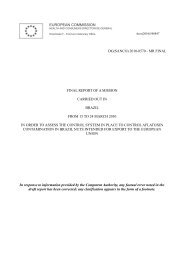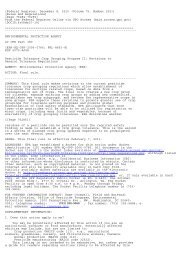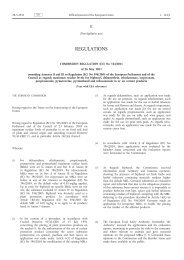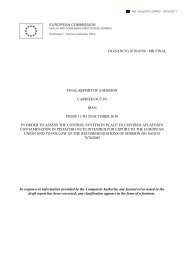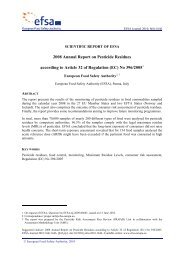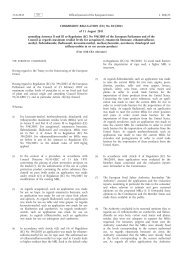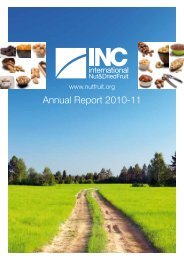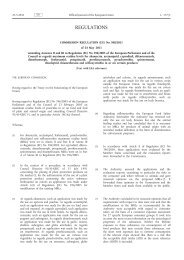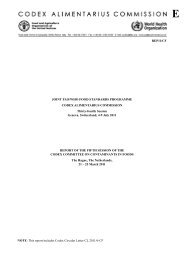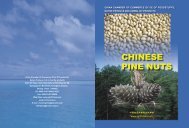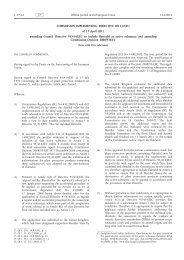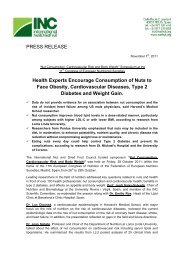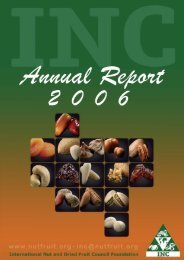REP11/PR JOINT FAO/WHO FOOD STANDARDS PROGRAMME ...
REP11/PR JOINT FAO/WHO FOOD STANDARDS PROGRAMME ...
REP11/PR JOINT FAO/WHO FOOD STANDARDS PROGRAMME ...
You also want an ePaper? Increase the reach of your titles
YUMPU automatically turns print PDFs into web optimized ePapers that Google loves.
<strong>REP11</strong>/<strong>PR</strong> 14<br />
128. Some delegations pointed out that MRLs could always be revised when new data became available and therefore both<br />
alternatives could be considered provided the conditions for revision or revocation of MRLs were clearly specified on a scientific<br />
basis.<br />
129. The Delegation of Australia indicated that in CRD 24 they had proposed an approach that would allow existing CXLs to be<br />
retained without a residue re-evaluation provided a toxicological assessment by JM<strong>PR</strong> does not raise any health concerns; dietary<br />
exposure estimates are below the ADI and the ARfD; and there is evidence of GAP relevant to existing CXLs. The Delegation also<br />
highlighted the role of the priorities working group to give advance notice of the periodic re-evaluation and the need for providing<br />
relevant data in a timely manner.<br />
130. The Committee considered whether the rest of the document could be reviewed at the current session. However several<br />
delegations pointed out that it would be preferable to resolve the issue of the periodic review before reviewing the text as a whole to<br />
ensure consistency with the Working Principles for Risk Analysis.<br />
131. Following further consultations between interested countries, the Committee considered a new proposal put forward by Brazil<br />
in CRD 28 as a basis for future discussion of the periodic review, as follows:<br />
1) When a CXL is not supported by the manufacturers: the interested member countries can support the MRL submitting the<br />
GAP or to provide new residue data and GAP to JM<strong>PR</strong> for a new recommendation.<br />
2) When the whole compound is not supported by the manufacturers: the interested member countries can support the reevaluation<br />
of the compound by submitting residue data and the monograph of toxicological data to JM<strong>PR</strong>. If the<br />
monograph is not enough, JM<strong>PR</strong> can request for additional data.<br />
The Delegation of Brazil also suggested to request JM<strong>PR</strong> advice on the minimum data requirement for submission in case the<br />
complete toxicological database was not available (e.g. summary data).<br />
132. The Committee agreed that reference to monographs referred to national monographs of toxicological data for submission to<br />
JM<strong>PR</strong>.<br />
133. The Committee also agreed to use these proposals as a basis for further work, with the understanding that more detailed<br />
discussion would be needed to develop specific recommendations.<br />
134. The Observer from CropLife expressed the view that both recommendations seemed to conflict with JM<strong>PR</strong> responsibilities as<br />
they implied that JM<strong>PR</strong> would work with reduced data sets for the re-evaluation of MRLs; it was unclear how JM<strong>PR</strong> could update<br />
dietary risk assessment based only on GAP; JM<strong>PR</strong> can only make an informed decision when they have access to the full data set<br />
as currently required and to what extent they need to make use of these data has to be decided on a case-by- case. The Observer<br />
expressed concern that these changes may undermine the public confidence in Codex MRL, and generally supported retaining the<br />
principle of the current Periodic Review Procedure, with possible amendments for clarification purposes.<br />
135. The JM<strong>PR</strong> Secretariat recalled that data requirements for submission to JM<strong>PR</strong> were already defined and applied to any set of<br />
data submitted for assessment; when any information was missing, the submissions would be evaluated on a case by case basis;<br />
and only nationally approved GAP should be submitted to JM<strong>PR</strong>. Toxicological monographs would not need to be re-submitted, but<br />
only updated additional information, including toxicological data if available.<br />
136. The Committee discussed how to proceed further. Some delegations pointed out that the revision of the periodic review might<br />
affect other sections of the document and therefore the Risk Analysis Principles as a whole should also be revised concurrently,<br />
according to the initial mandate of the Committee. The Chair also recalled that the revision should be completed by 2013 in<br />
accordance with the Strategic Plan 2008-2013.<br />
Conclusion<br />
137. The Committee therefore agreed to re-convene the electronic working group chaired by Argentina and Brazil, working in<br />
English and Spanish, to develop proposals for the revision of the periodic review as a priority and, if feasible, to review the entire text<br />
of the Risk Analysis Principles, for consideration by the next session. It was also agreed that, if necessary, a physical working group<br />
chaired by Argentina and Brazil and working in English would be held prior to the next session in order to facilitate discussion in the<br />
plenary. The Delegation of Brazil emphasized the importance of effective participation and contribution of member countries in the<br />
work of the working group in order to advance work on the revision of the Risk Analysis Principles.



